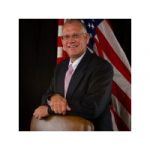
A movie poster for “Legends of the Knight,” which will be screened at the Historic Grove Theater on April 27 to benefit ADFAC.
On March 30, Batman turned 75. That same day, our church celebrated a 24th birthday and a 10-year anniversary of having moved into the Grove Theater. The irony of it hit me like a ton of bricks because many of the seeds that led me to become a minister were, strangely enough, planted throughout the pages of my childhood comic books.
Batman has had his share of ups and downs over the years. From the most campy television programming imaginable in the 60s, to witnessing Robin bludgeoned to death by the Joker in the 80s, to actually dying and being resurrected a few short years ago…I’ve managed to stay with the Dark Knight through his many twists and turns. At age 45, perhaps I should have outgrown it all, but I haven’t.
The truth is I owe my childhood heroes a pretty huge debt. They instilled in me at a very early age the belief that truth and justice were not just abstract forces in the world, but that they could be shared and experienced with enough effort and courage. At a time when it felt like the world was growing more cynical and afraid, I came to believe that honest people could really make a difference—that good really could win out in the end. The stories of my childhood were saturated with hope.
Moving through ministry for about two decades now, I almost always find that I arrive back where I started. I find that, fundamentally, hope is a life-blood running through the veins of healthy people. I find that fear, doubt, and cynicism are toxins that course through the bodies of the most unhealthy. I also discover that I am not immune to any of it. I experience these poisons too, times when I wonder if I shouldn’t just hang my hat and choose another profession in despair over our human condition.
Our culture seems often buried beneath a tidal wave of confusion and pain; I confess to sometimes being rolled over by the weight of it, crushed even. When that happens, I find myself flipping pages again. Sometimes it is the gospels, sometimes a Batman comic. Despite being very different stories, they do have at least one thing in common: They say that the human tragedy can often serve as a source of great strength and power. When I read, I am reminded that no matter how bad things get, there is Light in the darkness. I read and come to accept that our lives fundamentally have purpose and that we can make a difference. Suddenly, without realizing it, I start to become the change I want to see in the world. The hope, latent in those pages, starts to grow real hands and feet.
I was reading a biology article a few weeks ago that offered a disturbing thought: If all the insects on the face of the earth were to die today, most everything would be extinct within 50 years, including human beings. The quote went on to say that if all human beings on the face of the earth were to die today, most everything alive would flourish within 50 years.
I don’t know for certain if that’s true, but it seems plausible. If it is true, what does this say about us? Surely, this cannot be our story, can it? I can’t accept this story because there is no hope there outside of ridding the earth of human beings. (Have you seen Darren Aronosky’s version of the Noah story? It certainly reflects much of this sentiment.)
It seems to me that the human race needs good stories now more than ever—I don’t mean “escapist” stories that steer us away from reality, but rather stories that inspire us to do better and to become more than what we are. These kinds of stories are only fictional to the degree we refuse to give them opportunities to transform us into agents of Hope.
That’s where Easter comes into play for me. Easter teaches me that the human story doesn’t end in the violence, murder, and waste of a cross. I learn that there’s hope on the other side of a seemingly insurmountable tidal wave of despair. I am urged to never accept the pain and tragedy of our human condition as the real ending. Easter calls me to participate in beauty, to believe in that beauty long enough to let it change me. And the story of Easter has done just that, it has changed me. It continues to change me as I walk in Faith.
When Bruce Wayne was a little boy, he saw his parents murdered before his very eyes. Refusing to accept this as the end of his story, Bruce adopted the belief that one person could make a difference. He devoted his family’s fortune and his own well-being, sacrificing his personal comfort in order to resist the tidal wave of toxins that plagued his city. The Batman has no super powers in these stories. He is simply the product of an unwavering belief, committed to the purpose and hope that his belief engenders within him. His belief made a difference and not just in the fictional world of Gotham City. His story just turned 75 years old and thousands of people have drawn inspiration from it. (See www.wearebatman.com for some examples!)
I believe it is relevant to ask: “What will you accept as the end of our human story?”
Millions have received hope from the Easter story. When it comes to what we believe and how we hope, we get a snapshot of which side of the tidal wave we’re on. Clearing a path through despair isn’t easy. If that biology article I read is true, we going to need more people willing to embody the better ending.
May Hope abound in you this season.
David Allred is the lead pastor at High Places Community Church. On April 27, the Grove Theater will host a charitable screening of “Legends of the Knight,” a new documentary that depicts the true stories of ordinary people who found inner strength and the will to serve their communities from Batman stories. All proceeds from the screening will go to support Aid To Distressed Families of Appalachian Counties.
For more information visit the event pages:



David Allred says
Please, please support the April 27 event! I am donating much of my personal comic collection to THE REAL wonderful community heroes at Aid to Distressed Families!! They do the GREAT work in this community!